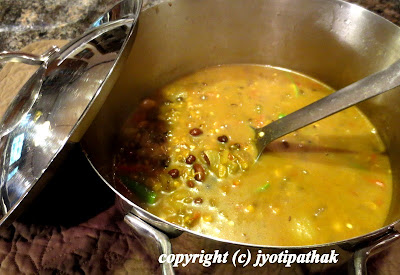Kwaanti or Biraulaa ko Ras - Sprouted Bean Soup
 |
| Colorful array of homemade sprouted beans |
 |
| A taste of tradition - celebrate the festival of Janai Purnima (August 21, 2013) by preparing the much loved kwaanti - sprouted bean soup. |
Here is my step-by-step guide to making sprouts and kwaanti soup. I have provided the full recipe at the end of this post.
 |
| Once the beans are soaked, they will swell and double in size. Discard the soaking water. |
 |
| Kwaanti soup (see recipe below) is easy to put together. You do not need to spend hours in the kitchen. All you need to do is simmer slowly until tender. |
 |
| Close-up view of slow simmering. For variation, you may add ground meat or momo dumplings in the soup. |
 |
| . . . Now the soup has become stew-like, and is ready to be served! |
 |
| Here is the delicious, healthful, and comforting mixed sprouted bean soup (kwaanti). Pour over a bowl of freshly steamed rice and enjoy. A must try! |
 |
| Here is a close-up picture of a protein-rich vegetarian kwaanti soup. This is such a great combination of flavors and textures! |
 |
| Enjoy the delicious kwaanti ko ras of Nepal from my kitchen. |
 |
| From Jyoti's kitchen - serving kwaanti soup and celebrating Janai Purnima festival. |
 |
Read more about the benefits of sprouted beans from the Kathmandu Post (here).  "Most festivals in Nepal are associated with great feasts, and these feasts include quite a few dishes that are healthy as well as being delicious turns of local cuisine. Such is the case with food prepared on the recently-passed Janai Purnima, also called ‘Kwanti Purnima’ by the Newar community. Kwanti is a Newari word that translates directly to ‘hot soup’, consumed in large amounts during Janai Purnima. It is essentially a sprout soup, comprising of nine varieties of beans—black-eyed peas, kidney beans, black gram, chickpeas, azuki, soybeans, mung, peas and favas—although people tend to add other kinds as well. The beans are washed, mixed and soaked overnight, and then allowed to sprout by covering, once they are drained, and storing them in a warm area for two to four days. The sprouted beans are then cooked into a thick soup with different spices. Grain legume seeds are an important source of protein, energy, vitamins and minerals for human and animal consumption. The proteins in these legumes are relatively low in sulphur-containing amino acids, but are richer in other essential amino acids compared to cereal grains. It is therefore advisable to consume these legumes with cereals—say rice or chiura—for the best, most balanced results......." To read the complete article on the "Call of kwanti," please click here. The Taste of Nepal Cookbook Kwaanti Ko Ras recipe follows: |
2 cups mixed sprouted Beans
2 tablespoons clarified butter (gheu)
4 to 6 large cloves garlic, sliced
2 fresh mild green chilies, split lengthwise
1/2 teaspoon ground turmeric
A generous pinch of ground asafetida
1 medium onion, halved lengthwise and thinly sliced
1 1/2 teaspoons ajowan seeds
Salt to taste
2 medium tomatoes, chopped (about 2 cups)
4 teaspoons minced fresh ginger
1 1/2 teaspoons ground coriander
1 teaspoon Garam Masala
1 teaspoon ground cumin
1/2 teaspoon cayenne pepper
2 bay leaves
1 tablespoons mustard oil
2 dried red chilies, halved and seeded
1/8 teaspoon Himalayan herb (jimbu)
1/4 cup finely chopped cilantro (fresh coriander)
Directions:
Rinse the sprouts in several changes of running water. Discard any seed coatings that come loose and float to the top of the water. drain the sprouts and set aside.
Heat the clarified butter in a heavy saucepan over medium-high heat. Add the garlic, green chilies, turmeric, and asafetida and fry for 10 seconds. Add the onion and cook stirring constantly, until lightly browned about 7 minutes. Mix in the sprouted beans, 1 tablespoon of the ajowan, and the salt and cook, stirring from time to time, until lightly fried and the moisture from the sprouts have evaporated. Add tomatoes, giger, coriander, garam masala, cumin, cayenne pepper, and bay leaves and cook until the tomatoes have softened. Stir in 4 cups of water and bring the mixture to a boil. Reduce the heat to medium-low, cover the pan, and simmer. Check occasionally to see if the water has evaporated or the beans are soft. If not, add more water and continue cooking, covered. The beans are ready when they are soft when pressed between your fingers. It may take 45 minutes to one hour. Remove the beans from the heat and keep covered.
In a small skillet, heat the mustard oil over medium-high heat until it faintly smokes. Add the dried chilies, jimbu, and the remaining 1/2 teaspoon of ajowan and fry until dark brown and highly fragrant, about 5 seconds. Remove the skillet from the heat, immediately pour the entire mixture onto the cooked bean dish, and stir well. Cover and let stand 10 minutes before serving. Transfer the beans to a serving dish, sprinkle with cilantro on top, and serve - Makes 4 to 6 servings.








